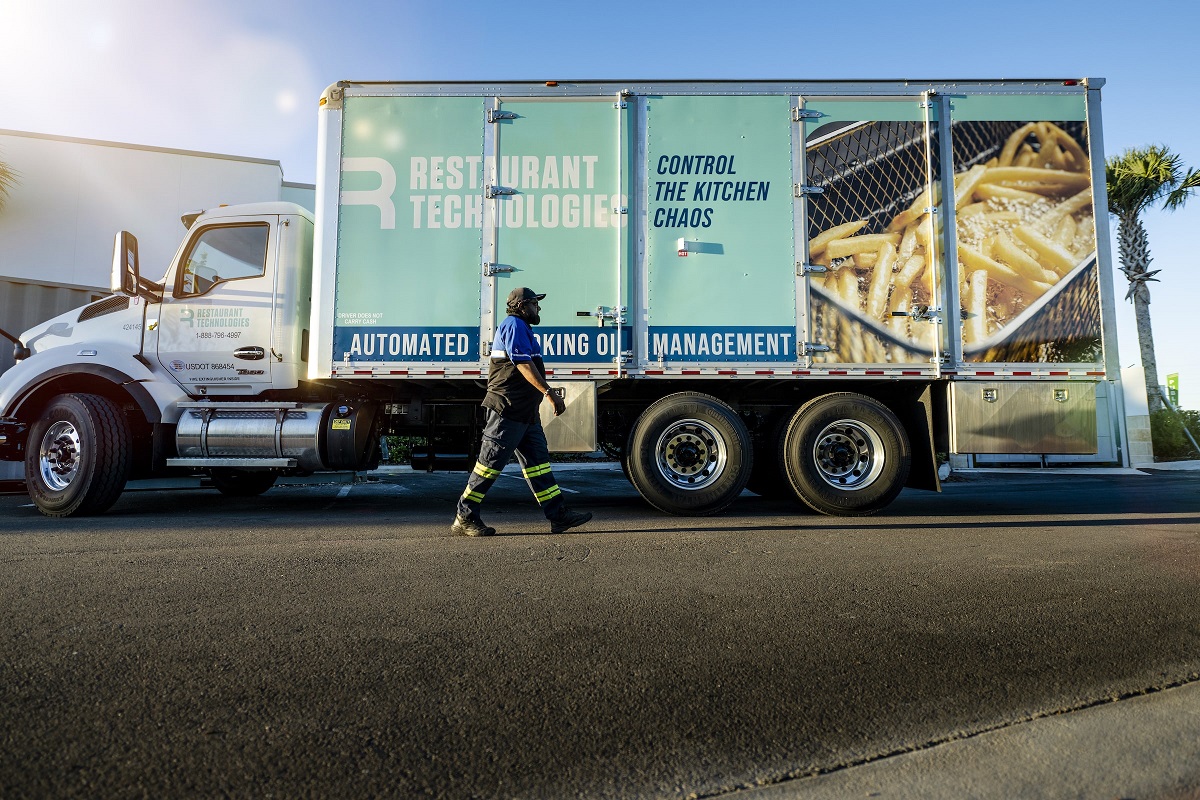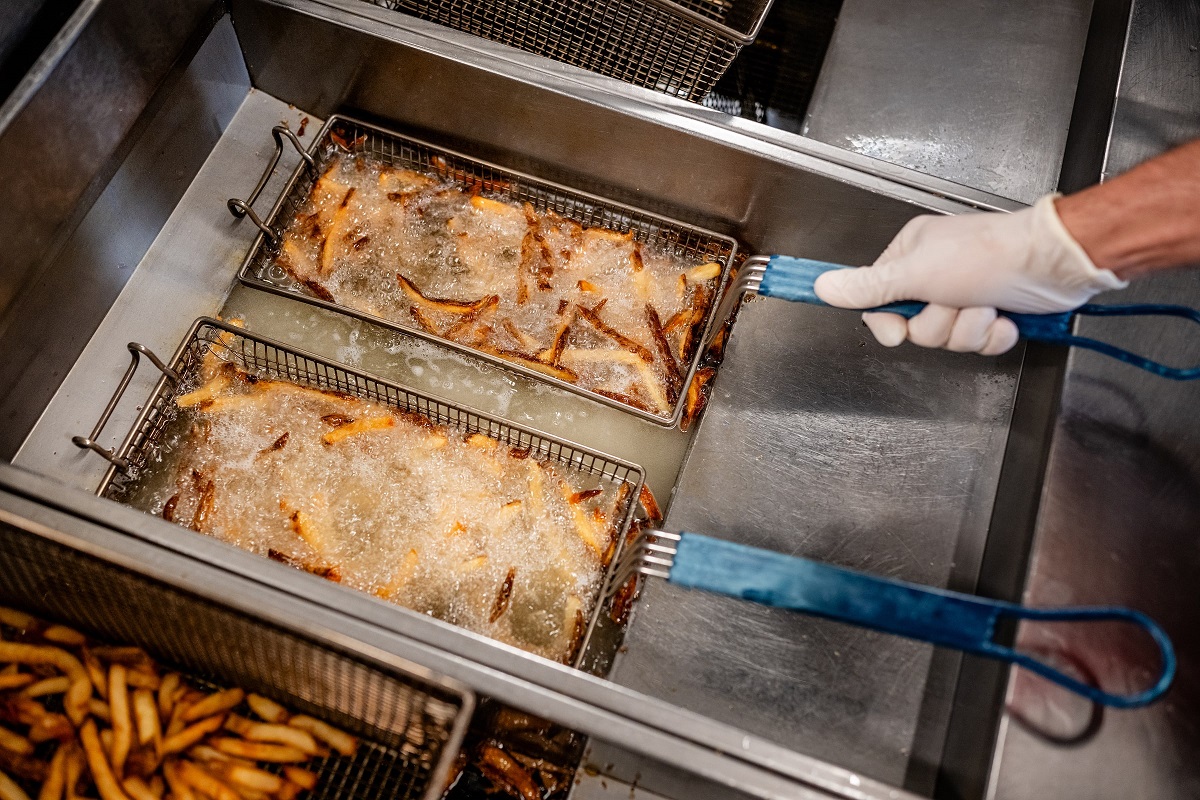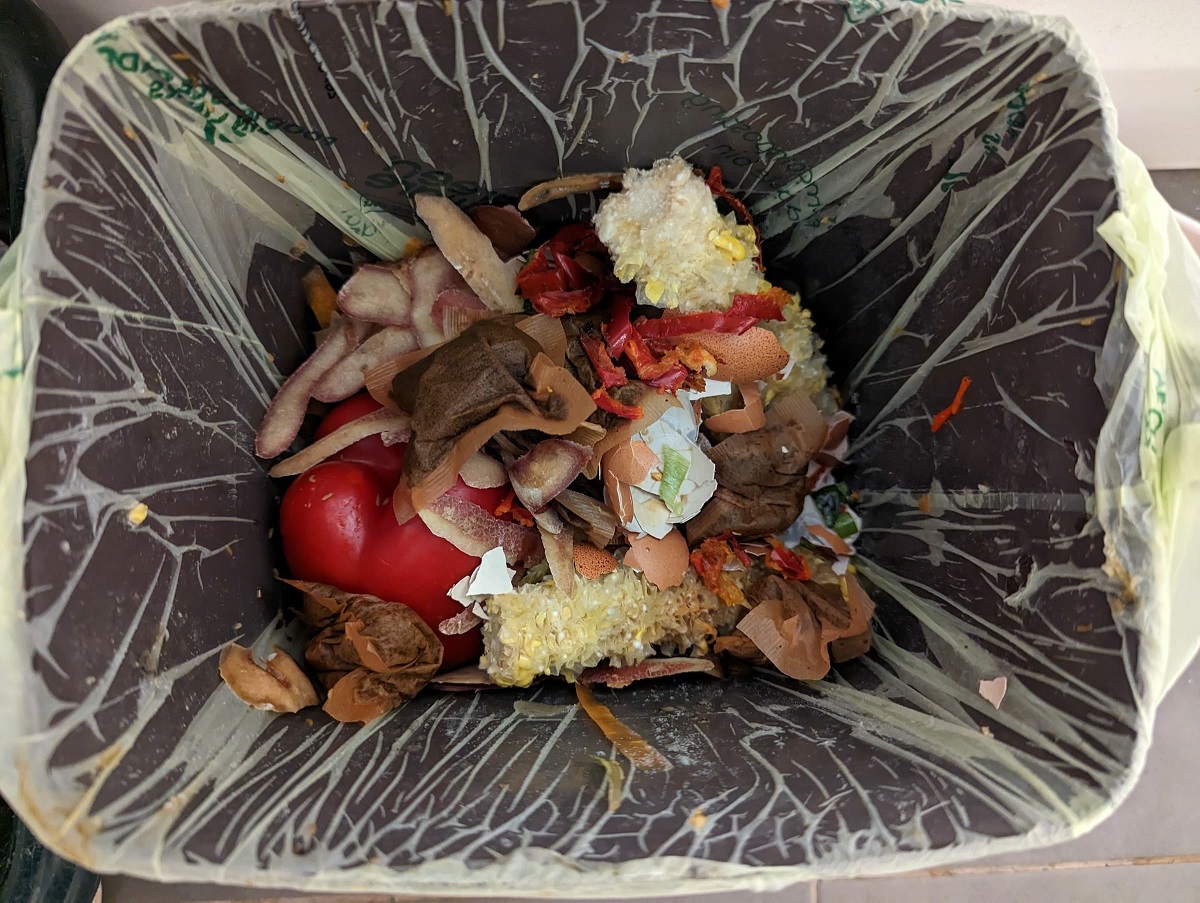Randy Witt helps restaurant managers keep an eye on the fryers in their kitchens, with online information portals.
By Mary Connor
MINNEAPOLIS – January 24, 2013 – When Randy Witt talks about the company he works for, his listeners don’t always clamor for more. He offers an example:
“You know, I work with Restaurant Technologies.”
“What do they do?”
“We provide a safe, economical, green solution for restaurants to handle their cooking oil.”
“Oh.”
Witt, who is Director of Information Technology for the Mendota Heights–based company, has run into this nonplussed reaction from family, friends—and even candidates for jobs at the company. “There’s a little skepticism, but when I start to tell the story and what we’re doing . . . at the end of that interview, I can always see a big smile, the excitement, and the ‘I want to be part of this,’” he says.
Indeed, Restaurant Technologies, Inc., (RTI) is one of Minnesota’s more compelling entrepreneurial success stories of the past decade. RTI provides a system that automates the filling, filtering, and removing of oil from restaurant fryers, which can be messy, heavy, and dangerous work if done manually. RTI installs two storage tanks at a restaurant, hooked into the fryers. Flipping a switch sends clean oil from one tank into a fryer or drains used oil from the fryer into the other tank.
The system also alerts RTI when it’s time to fill or empty the oil tanks, so the company’s pickups and deliveries happen seamlessly from its network of depots around the country. RTI gets additional revenue by selling the used oil to biodiesel and animal-feed producers.
The company’s initial good fortunes came from hitching its wagon to the fast-food behemoth McDonald’s, one of RTI’s first customers. Selling to McDonald’s made it easier to sell to other companies, and RTI has seen dramatic growth and been named to numerous fastest-growing-companies lists.
Witt’s team created and maintains RTI’s Total Operations Management™ online portal, which restaurant owners use to monitor their fryers and oil usage. “The fryer, through sensors, will send back data to us, and we present that to the customer,” he says. The portal serves as a dashboard for restaurant owners and managers. They can see how often the cooking oil is being filtered or disposed of and whether those actions conform to their expectations. Employees may be holding on to oil too long or not filtering it enough, which could change the flavor of the food. Alternately, oil disposed of too soon could be raising operating costs unnecessarily.
“We launched this platform,” Witt says. “We redeveloped it foundationally from the ground up, using the latest, most current technology—it’s a Microsoft-based platform, and it has the ability to scale.”
Witt has been recognized for his customer reporting applications by CIO magazine. A 2012 award focused on the company’s Customer-Centric Reporting System, a series of reports that summarize the metrics RTI gathers. “So [with] oil usage, maybe you look at the green aspect, you look at service history,” Witt explains. “It’s bundled in such a manner that it’s a comprehensive but very visually appealing format.”
The system assists the company’s salespeople, giving them easy-to-read data to discuss with their clients, and serves RTI’s fast-paced ramp-up of accounts. “I’m trying to arm the sales team with information so that they’re not surprised, and so we are perceived as a strategic partner versus just the oil guys,” Witt says. “This information is so important, as the sales team continues to be stretched to service more accounts.”
RTI’s fast growth can be a challenge for Witt’s IT team. He talked to Twin Cities Business about that and his current projects.
MC: What role does your IT team play in RTI’s oil-management system?
RW: [With our] portal, customers see various [key performance indicators] and metrics around oil usage, and it helps provide guidance as far as areas that they can improve. We will install a device in a store location, and that will transmit back daily the tank-level reading. We use that for just-in-time delivery—that customer receives oil when they need it to avoid any oil-out situations.
That system is supported by my team. It started out as an analog solution that was dependent upon the phone line, so we’d get about 15,000 phone calls per night. In 2008, it became a network-based solution that would get installed at the restaurant location and use their Internet connection. More recently, we are developing a cellular-based solution that just uses an AT&T cellular connection to communicate out. As we look at the number of installs we have next year, a large percentage of those should have the cellular-based device.
On the distribution side, [Oracle serves as] a routing optimization platform. It goes to a handheld. The driver logs in the driver ID, the truck ID, route number, and then it states, ‘These are your stops today.’ As stops are made and product is delivered, it’s sent back to Oracle, where invoices are generated. Three years ago, we had well over 340,000 deliveries in a given year. We planned our day [with Excel spreadsheets], so this is now assisting with that capability.
MC: What other types of support does your team provide?
RW: We do not sell our equipment. It’s all covered under a program—for the life of that contract we’ll service that equipment, so if there’s ever an issue, our customer care center will take the call. If a McDonald’s contacts us and just says, ‘We cannot add the oil,’ or there’s something with the equipment, that will go through our customer care center. They’ll open a ticket in Oracle.
We are about three weeks from finishing a rollout of the new service-automation platform, and that gives every field technician in the country a Motorola handheld. It will look at who is in the vicinity, who has the right skill set, who has the right parts . . . it will then send that job to that technician. We can visit more sites, we can better estimate when we are going to be at a location, and there is excitement within the service organization about this, because it’s going to help them be more efficient. And eliminating a lot of the paperwork in the back office components gives back the service manager maybe 40 to 60 percent of his day, so they’re out visiting customers.
MC: Do you plan to expand the types of services you offer to customers?
RW: The plan is, yes. What’s interesting, if you’re in a McDonald’s location, the grill is computerized. I put six patties down, and I program the grill for six patties, and then I pull the press handle, and it grills on the top and bottom. I don’t flip a burger at McDonald’s. It knows that I have six quarter-pound patties or four one-third pound or ten one-tenth of a pound on that grill. A lot of the equipment at McDonald’s locations is building in intelligence, and so we are starting to extract that and present it in a manner [so] that restaurants can become more effective in the use of their stores.
MC: What projects are you focused on for 2013?
RW: There’s a lot going on . . . international projects and [an Oracle] ERP upgrade, the cellular-based solution, continued expansion of the data warehouse, a data center move, setting up disaster recovery in a redundant location, as well as a slew of IT-specific operational projects just helping us get to a common standard and platform.
International expansion is going to be a big one from an IT standpoint. If Europe is our first entry point, we need to consider currency, we need to consider the metric system—instead of gallons, it’s now kilograms or liters. We look at the language question. Is it still going to remain in English, or are we now German, French, Italian? And that’s just in Europe. As we start to look at the potential for South America or eventually becoming a global organization, readiness for that.
More foundational would be disaster recovery. We are in a data center in Minneapolis. We are moving to a data center in Minnetonka. So moving that infrastructure in a manner that is not disruptive to the organization, while upgrading at the same time, you know, there’s a lot of moving parts in there.
MC: Your current data center is in Minneapolis?
RW: A colocation—a location that has, essentially, racks for rent. We moved in . . . a few years ago. Now as we look to become a global organization, we’ve found somebody that provides even greater reliability. When we think about where we are going to be in five years, the data center has to be solid, especially as the data from customers continues to increase and their reliance upon availability continues to increase.
MC: What are the biggest challenges in your role?
RW: It’s not a challenge, but I’m going to start here: The beauty of working for a small company is you get to do everything. It’s not like I have a team of 10 [database administrators]. But for the group that I bring in, I’m very transparent and candid: ‘You may have to wear multiple hats on different occasions.’
It’s certainly fun to be part of a growing company, [but it’s] not without its challenges. When I came here in 2007, there were only two people in the IT department. Today, it’s 24 full time, and we’re looking to add an additional four full time next year. With the projects that we are working on, there will probably be an additional 10, 12 contract employees on top of that.
[Another issue] is recruiting good talent in this market.
MC: We’ve heard that from other people, too.
RW: There are certain skill sets where it certainly is more challenging than others. It could be in an Oracle skill set or .NET business analysts, even project managers to an extent. But we as a smaller company don’t have that name recognition. We’re competing with the well-known entities, the UnitedHealth Groups, the Thomson Reuters, the Targets, the Best Buys, and so on. We have to provide an environment that entices. We really focus on employee engagement. What are the demotivators that are in your day? Is your manager not giving you feedback? Do you have one-on-ones? Flexible work schedules, you know, training, access to whatever materials you may need to help you develop in your career? It’s what has allowed me to build a strong team and recruit good talent.
MC: What do you enjoy most about your job?
RW: Ultimately for me, it’s the development of individuals. If it’s a business analyst that finally has gotten the knack for gathering solid requirements, if it’s . . . individuals coming in out of a tech school, this is their first job. Just seeing how well they are doing in their role and the confidence that they have now in their position. That development from starting in the service desk position to . . . overseeing our ERP implementation, as an example, there’s a lot of pride.
[Also] there’s ever the little bit of a geek in me . . . working with the new technology. But it’s also how we can make our salespeople more effective in selling more, our delivery driver more effective in doing his or her job. It’s always asking that question: What can we do to help the organization? Seeing organizational success and knowing how my team has contributed in that certainly is exciting.
Witt By the Numbers:
- Time in position: 5 years
- Number of IT staff: 24 full time, with additional contractors as needed
- Number of users: RTI employs about 725 people in more than 40 locations; the RTI cooking-oil system is installed in about 18,500 restaurants, with the company planning to add 3,000 new systems per year.
- Major software: Oracle
Background:
“I started [at RTI] in 2007—North Carolina State University is where I graduated from. I worked for an insurance company, then worked for a utility company, heard about an opportunity with Northwest’s regional partner, Mesaba Airlines. They were looking for somebody to assist in building out an environment after they had a failure one December of their flight dispatching system, resulting in a couple of days’ worth of cancellations. That’s what brought me to Minnesota.
“I went to Target for a period of time, in the technology acquisition team. I obtained my MBA and got additional degrees in that time. I worked for a check printer in the north metro, and then a recruiter mentioned this little company called Restaurant Technologies, and the more I learned about it, the more exciting it sounded.”
Read this article on Twin Cities Business
About RTI – Restaurant Technologies, Inc.
Restaurant Technologies, Inc (RTI) is the leader in smart, safe, sustainable oil and operations management technology for the food service industry. The company’s fully automated oil storage, handling and disposal management system helps increase worker safety, improve restaurant cleanliness and minimize frying oil inconveniences. RTI data management solutions provide restaurant decision-makers with increased visibility into oil usage for better food quality and consistency. Headquartered in Mendota Heights, Minn., RTI serves more than 45,000+ customers via 40 oil depots throughout the U.S.
About Twin Cities Business
Twin Cities Business is Minnesota’s leading provider of business news, insight, and analysis through a monthly magazine, twice-weekly e-newsletter, daily online news stories, events, and an annual business information guide. Along with our readers, we get to know the personalities of our region’s most influential leaders, exploring the “how” behind their success, strategies, and solutions. We discuss today’s most pressing issues, examine trends and outlooks, and provide the context, perspective, and information leaders have come to depend upon.





